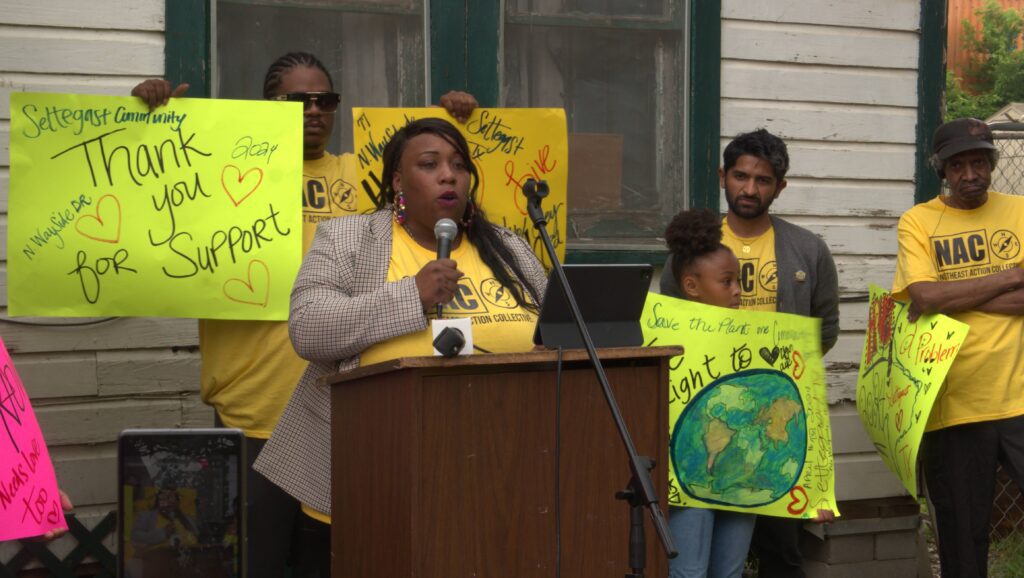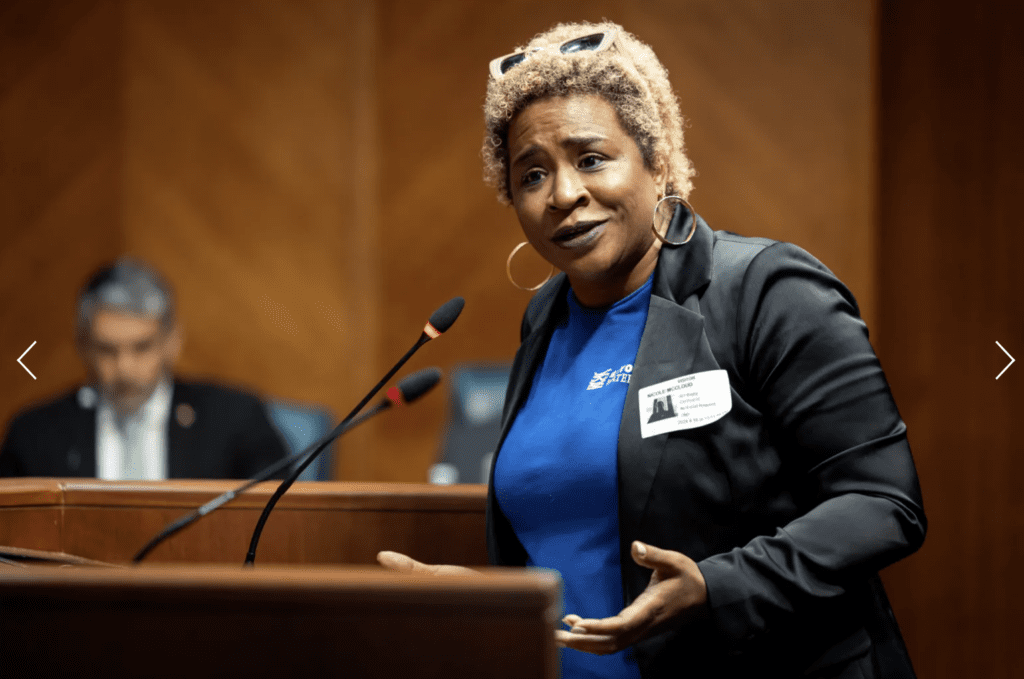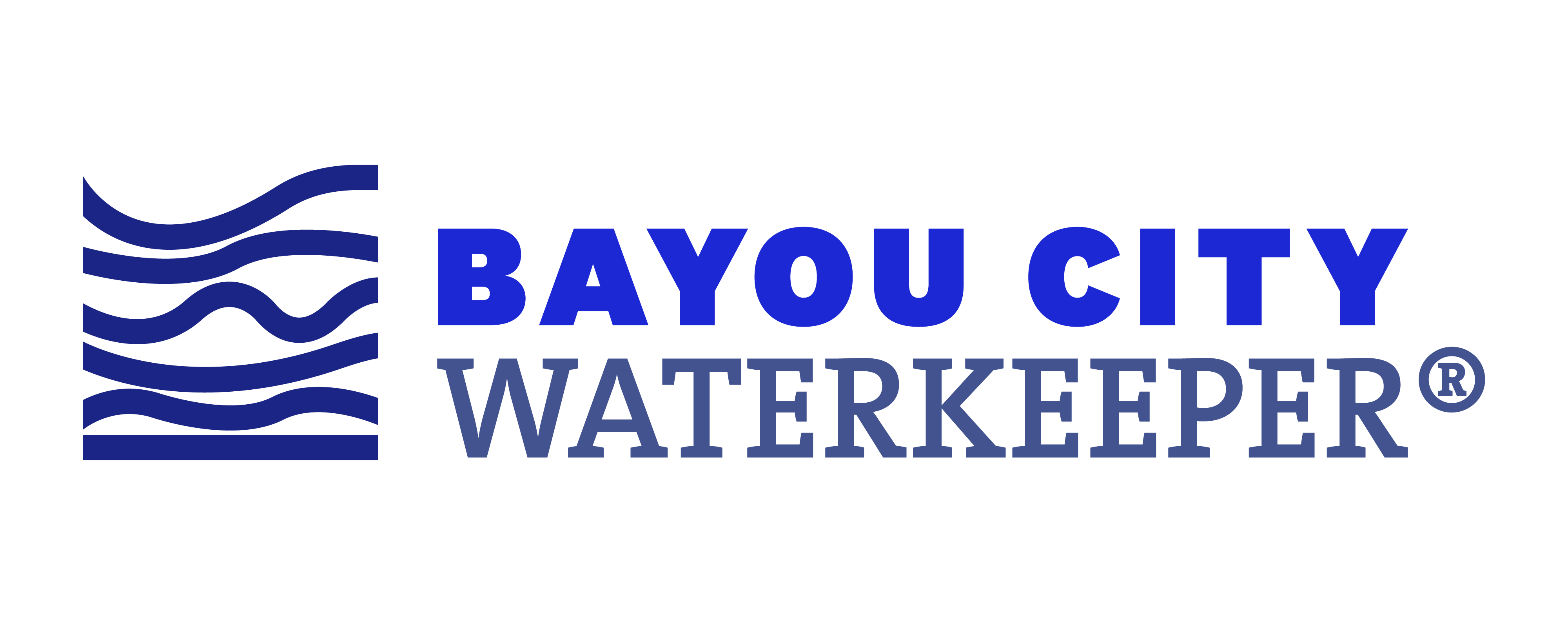By Sade Hogue and Ayanna Jolivet Mccloud

In Houston, we have a problem–a shameful one that is making family homes unlivable, contaminating our soil, and poisoning our bayous. Across the city, but especially in poor and BIPOC communities, sewage is spilling out of pipes, into yards, playgrounds and homes. The City has the power to do something about it through this year’s budget process. So far it has not.
For years, the underground pipe network built to carry waste from our sinks and toilets to wastewater treatment plants has been neglected, especially in Black, Brown, and lower-wealth neighborhoods like Settegast, in Northeast Houston, and South Union, in the Southeast. After decades of disinvestment, the system has simply broken down. Raw sewage spews out of the system in Houston every single day, into parks, playgrounds, and streetside drainage ditches.
Safe sewer systems are the foundation for public and environmental health. They are designed to keep e. coli and other viruses and bacteria out of our waterways, protecting us from once-common diseases like typhoid and cholera, as well as parasites like hookworm.
Exposure to untreated sewage can cause nausea, diarrhea, ear infections and other, more serious illnesses and also trigger asthma and other respiratory problems. These problems can become chronic over time. Living with sewage also takes a serious toll on mental health.
These risks get even worse during storms. Hurricane Harvey unleashed millions of gallons of untreated wastewater across the city, and even a regular rain can overwhelm aging sewer systems. The sewage impact of flooding earlier this month is unknown but surely severe.
But these spills aren’t just happening in our streets. The clogged and crumbling city pipes are causing backups on private property too, sending raw sewage, often a mix of fecal matter, liquid, and used toilet paper, to seep into the soil or bubble up in bathtubs. This isn’t just a health risk, but a threat to basic human dignity.

Sade is one of many Houstonians living this nightmare. In the heat of summer, a smelly brown haze fills her home, and rainstorms cause raw sewage to overflow the toilet. For years, she blamed faulty plumbing. Unfortunately, the problem is far bigger than that.
That’s because sewage systems are only meant to flow one way. So when the public sewer line isn’t working as intended, the private pipes that drain into it at the curb often start to deteriorate.
Right now, a partial fix is underway. The City of Houston is spending $2 billion over 15 years to replace aging sewer systems. But three years into this investment, they are only working on city pipes. Half of Houston’s sewage infrastructure is on private property, so preventing spills in people’s yards and bathrooms requires work on both sides.
This overdue investment was the result of legal pressure from Bayou City Waterkeeper, which triggered action by the EPA and the Texas Commission on Environmental Quality in 2018. Bayou City Waterkeeper, which has continued to analyze the disproportionate impact of these overflows through the Justice of the Sewers mapper, is teaming up with residents like Sade, the Northeast Action Collective, and West Street Recovery to push for the creation of a $20 million Sewer Lateral Assistance Program that will at last support justice in the sewers.
Sade invited journalists into her home last month and testified at City Council that same day to show how urgent the problem is for herself, her family, and others living across Houston. Moisture from the recurring leaks have degraded the house to the point that Sade has literally fallen through the floor. If not for support from West Street Recovery, Sade believes her home would have been condemned.
Sade’s family inherited the home from three generations of working class families. Her grandmother gardened along the fenceline. Now, it has become so unsanitary that her relatives refuse to come visit.
For those who can afford it, the problem is completely fixable. It’s only been allowed to fester so long because of who is impacted: if you are Black, brown, or poor in Houston, you are more likely to experience a sewer overflow and associated health harms. The City has the responsibility to intervene on behalf of residents who cannot afford to fix these problems on their own.
Allocating $20 million toward a Sewer Lateral Assistance Program would add one penny of investment to every dollar already required under the consent decree over the next decade. And if the City acts now, it can tap billions in federal water and wastewater funding to cover the cost of fixing both public and private pipes. It can also work to divert a portion of the penalties it continues to pay under the consent decree for sewage spills that continue to violate the Clean Water Act, as Jackson, Mississippi, and St. Louis, Missouri have done in the past.
In response to the demands of impacted residents, the City attempted to disclaim any responsibility for these repairs, pointing to the general state law prohibition on using taxpayer dollars for private individual benefits under Texas law. This misses the point. The consent decree makes clear that the city has the right to address overflows entering the municipal storm sewer system and sewage back-ups caused by the city’s main line. A city with the will to extend the full benefits of sewage investment to all residents would view these as opportunities to build on rather than point to generic provisions of state law.
It is past time for justice in Houston’s sewers. The leaders of our city, past and present, would never tolerate living with — excuse our language — this crap. The people who have sewage problems are not immoral, irresponsible or negligent. They are living with the constant stress and health impacts of unpredictable sewers, caused by decades of intentional underinvestment in lower-wealth Black and Brown communities like Settegast. This problem can be solved through unprecedented federal funds. And through the City’s action. It’s time for the City to act and show it understands that we all deserve to live with dignity in the place we call home.
About the authors:
Sade Hogue lives in the Settegast neighborhood of Houston, Texas, is a member of the Northeast Action Collective, and is a graduate student and mother. With her husband and two children, she is living in a home that has been in her family for 30 years with an unresolved sewage issue and is helping lead a campaign to increase investment in sewage issues across Houston. Ayanna Jolivet Mccloud is the Executive Director of Bayou City Waterkeeper, which protects the waters and people across the greater Houston region through bold legal action, community science, and creative, grassroots policy to further justice, health, and safety for our region. In the third year of monitoring the Houston consent decree through the Justice in the Sewers hub, Bayou City Waterkeeper is collaborating with community members, Northeast Action Collective, and West Street Recovery and working toward a vision of sewage justice that includes all Houston residents.
